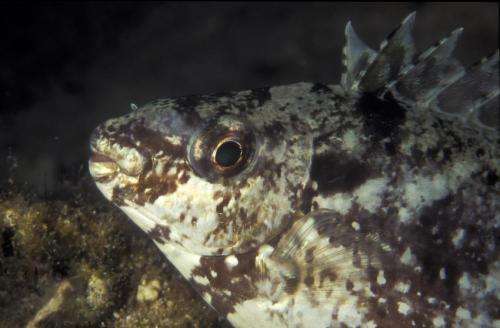Tropical fish a threat to Mediterranean Sea ecosystems

The tropical rabbitfish which have devastated algal forests in the eastern Mediterranean Sea pose a major threat to the entire Mediterranean basin if their distribution continues to expand as the climate warms, a new study warns.
The study, by an international team of researchers led by Dr Adriana Vergés of UNSW Australia and Dr Fiona Tomas of the Mediterranean Institute for Advanced Studies in Spain, is published in the Journal of Ecology.
Members of the team surveyed more than 1000 kilometres of coastline in Turkey and Greece, where two species of rabbitfish have become dominant since they moved into the region via the Suez Canal.
"The study identified two clearly distinct areas – warmer regions with abundant rabbitfish and colder regions where they were rare or absent," says Dr Vergés.
"The regions with abundant rabbitfish had become rocky barrens. There was a 65 per cent reduction in large seaweeds, a 60 per cent reduction in other algae and invertebrates, and a 40 per cent reduction in the overall number of species present."
The two tropical rabbitfish species were first reported in the eastern Mediterranean in 1927 and 1956 and have recently been found living as far west as Croatia and the south of France.
"Increased feeding by plant-eating tropical fish in temperate waters as a result of ocean warming is an issue of global importance that has the potential to transform marine ecosystems, as has also been seen in Japan."
Algal forests, or seaweeds, provide food and shelter to hundreds of species, and fulfil a role similar to trees in terrestrial forests.
To find out why algal forests were disappearing in the eastern Mediterranean, the researchers filmed a series of experiments and recorded the feeding rates of rabbitfish and other species. They found it was not necessarily a case of the tropical fish eating more algae than the native fish.
"The native temperate fish actually ate adult algae at a greater rate than the tropical rabbitfish. However the two rabbitfish consumed both young and adult algae, whereas native fish only ate adult algae. So the two rabbitfish can completely denude large areas by working together and having one species that targets adult algae and another species that removes the youngest algal recruits, preventing them from making a forest," says Dr Vergés.
"This research highlights the need to work out how the interactions between different species will change in a warming ocean."
Journal information: Journal of Ecology
Provided by University of New South Wales


















